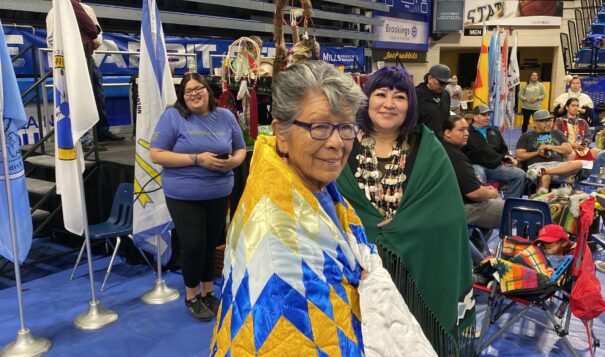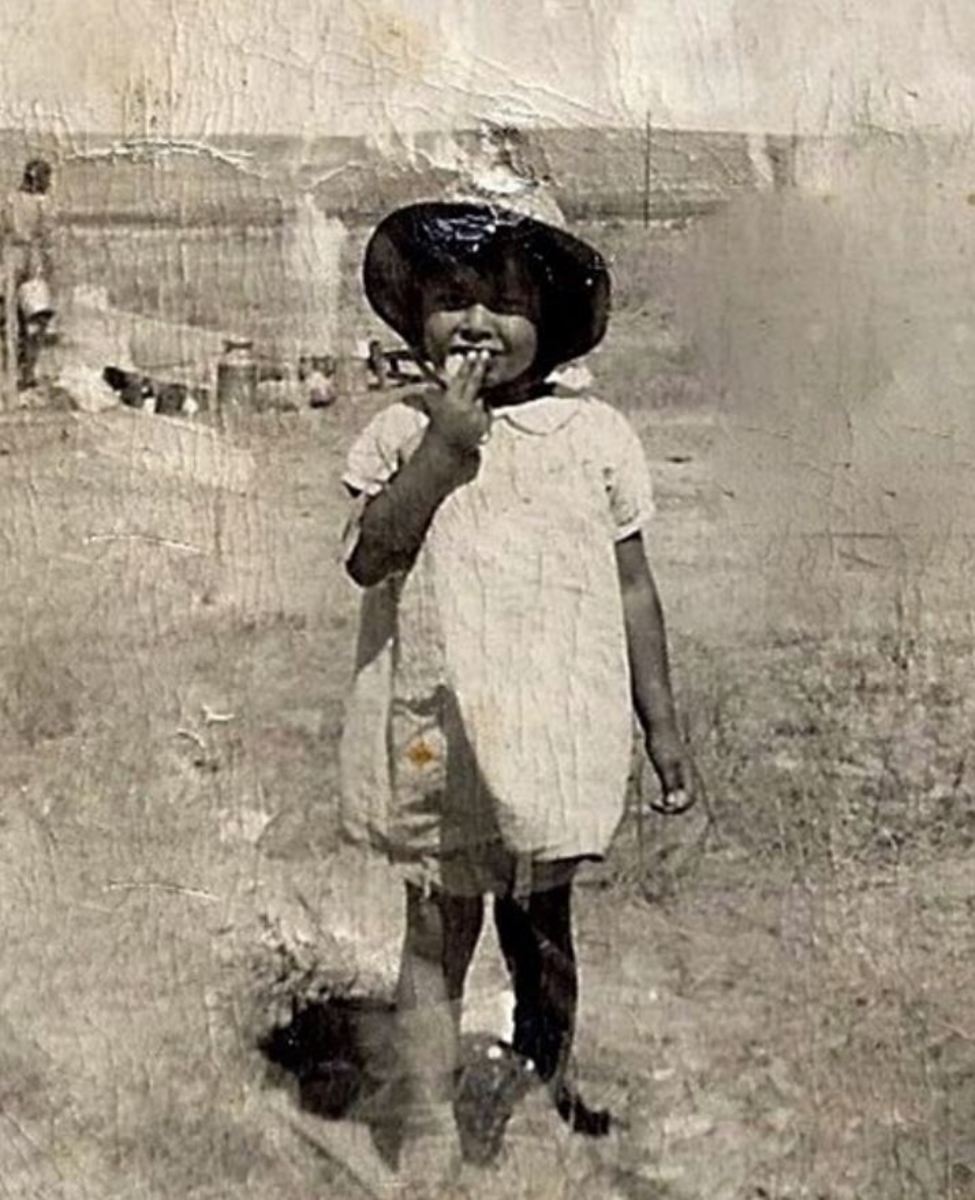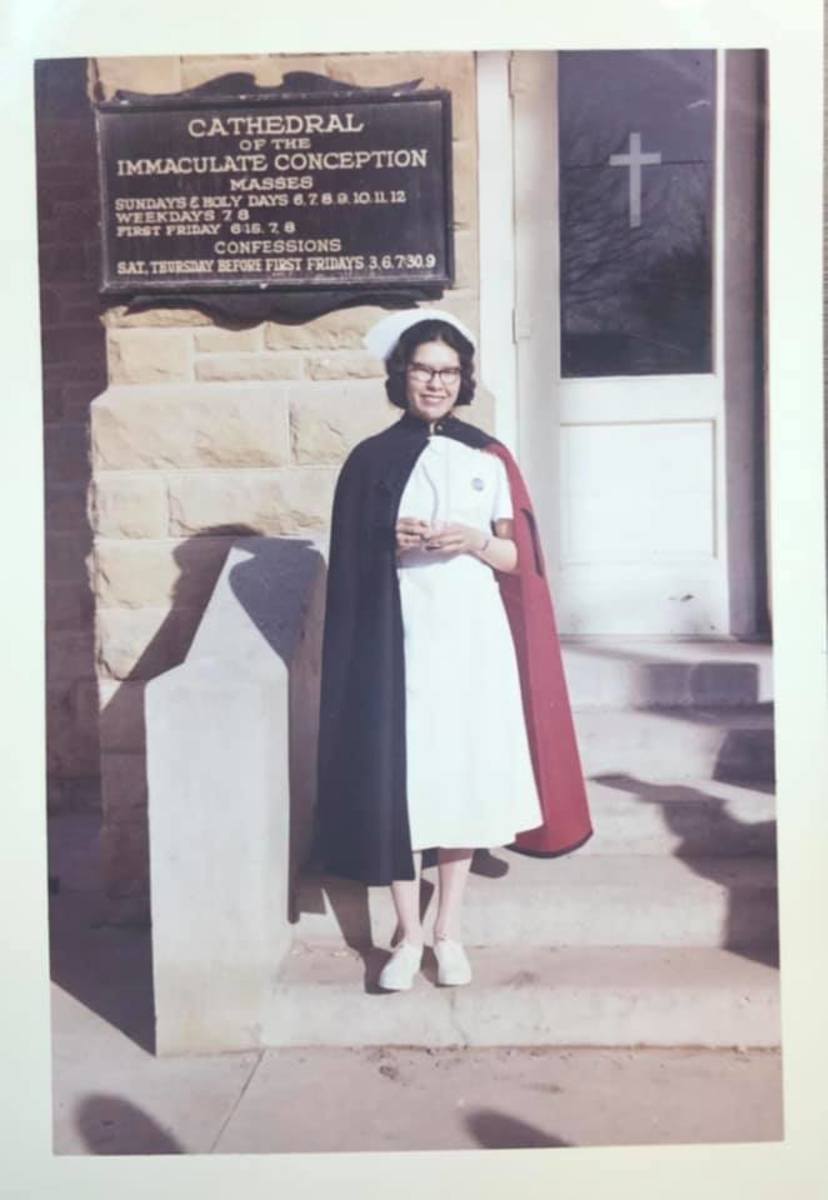News Based on facts, either observed and verified directly by the reporter, or reported and verified from knowledgeable sources.
Lakota woman leaves behind powerful legacy
 Bev Warne was honored for her contributions to nursing during the SDSU powwow in 2023. (Photo Courtesy of Jim Warne)
Bev Warne was honored for her contributions to nursing during the SDSU powwow in 2023. (Photo Courtesy of Jim Warne)
Bev Warne, powerhouse in the Rapid City Indigenous community, dies at 85
Beverly “Bev” Stabber Warne often reflected on memories of her grandfather drumming and singing at the crack of dawn and at sunset. She was born in a traditional way, beside a creek surrounded by her Lakota culture, and despite living in Thailand, Mexico and Arizona, Warne always kept her Lakota ways close to her heart.
At 84 years old on Sunday, April 14, Warne died in Rapid City, S.D. She was enveloped in love from friends, family and those she’d mentored through her life. The Oglala Lakota woman left behind a long legacy as a nurse, a mentor, a teacher, a mother, a knowledge keeper, and a powerful activist in the Indigenous Rapid City community.
When she was 9, Warne’s family left the reservation and moved to Rapid City. Native people weren’t allowed to own homes or rent in the city, so the family lived in a tent by Rapid Creek in Camp Oshkosh – a community of Lakota people living in tents and small clapboard homes. As the eldest, Warne took care of her siblings.

Walking down Main Street for the first time, Warne spotted a sign that read “No Indians Allowed.” Confused, she asked her father why. Her father responded, “Because they don’t know us.” That statement became incredibly important to Warne, her family said. Warne was highly dedicated to educating the Rapid City community about Indigenous people and providing pathways for Indigenous people to accomplish their goals.
“My grandma Eva, her mom, told her she’d be a healer,” her eldest son, Jim Warne said. “She (Warne) would sit with the elders that were passing and just talk with them. She said the responsibility of nurses today is to have that compassion for folks.”
Warne was able to graduate from nursing school because of her mentor, Sister Benedict. Benedict helped Warne secure a scholarship to graduate from the St. John McNamara School of Nursing. Warne was one of two Indigenous students to graduate in 1962. Because of the help and support she’d received from Sister Benedict, Warne was inspired to be the best mentor she could be for others.
“She takes mentoring to a whole new level,” said Amy Sazue, Oglala/Sicangu Lakota and the executive director of Remembering the Children. “She’s really good at looking at people holistically. She never saw their needs as deficits… As soon as a student walks in she says, ‘I’m your Unci, I want to be here for you and see you through your graduation and licensure. We’re going to get there together.’ She had such a big heart.”
After moving back to Rapid City in 2014, Warne served on the boards of several different local organizations including Remembering the Children, He Sapa Otipi and the Elders Council.

“I remember being at an event with her, not knowing for certain if she liked or accepted me. It was a short-lived thought as she soon pulled me close to her and kissed me on the cheek,” said former Rapid City Mayor Steve Allender. “I felt the love of a grandmother at that moment. I view her as everyone’s grandmother. She was special, she was loved, and she will be greatly missed.”
Remembering the Children and the Rapid City Indian Boarding School Lands Projects in particular were especially meaningful to Warne. Prior to moving to Camp Oshkosh, Warne was a student at the Pine Ridge Indian Boarding School. Her mom, Eva, had also attended boarding school.
“It was a multigenerational impact and she was able to manifest that trauma in a good way,” Jim Warne said. “As a respected elder and advocate she was often asked to speak on different causes.”
In 2015, she founded the South Dakota State University Native American Nursing Education Center. Warne closely mentored all of the students that came through the program.
“She made things happen,” said Kathy LaBonte, Ojibwe and a colleague and close friend of Warne’s. “If you couldn’t pay your rent she found a way to get it paid so you could stay in school. If they had a rough day in the ER, maybe they lost a patient, she would take them outside and smudge and pray with them. She’d talk about her own stories and how she had gotten through those situations. She made it so personal for the students.”

After she died, hundreds of people began posting to Facebook about Warne and the impact she had on their lives.
“There’s so many people whose lives she crossed, people I’ve never heard of, students, patients, policemen,” Jim Warne said. “In her last hours, she had so much family (there) and her nursing students and colleagues… I’m proud to be her son.”
Dateline:
RAPID CITY, S.D.
